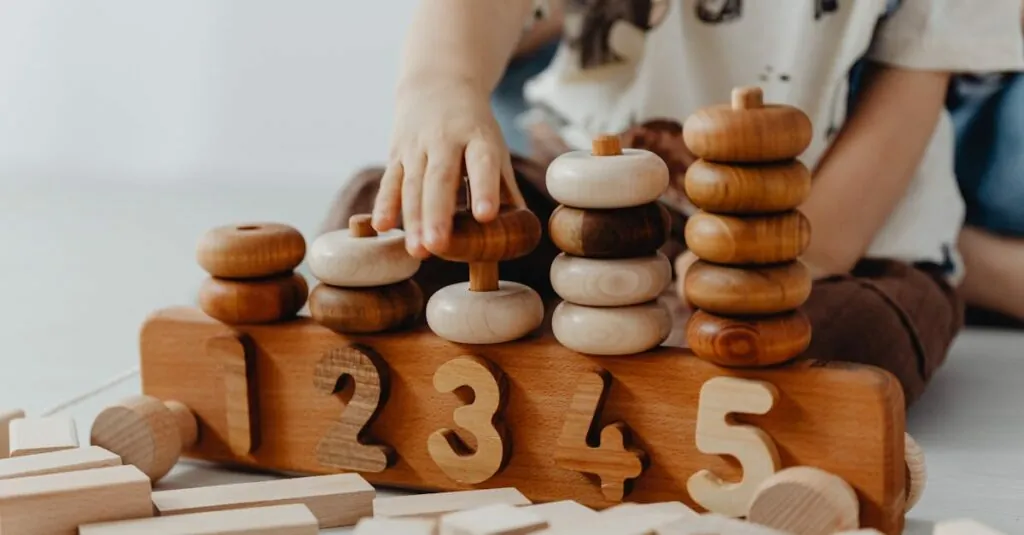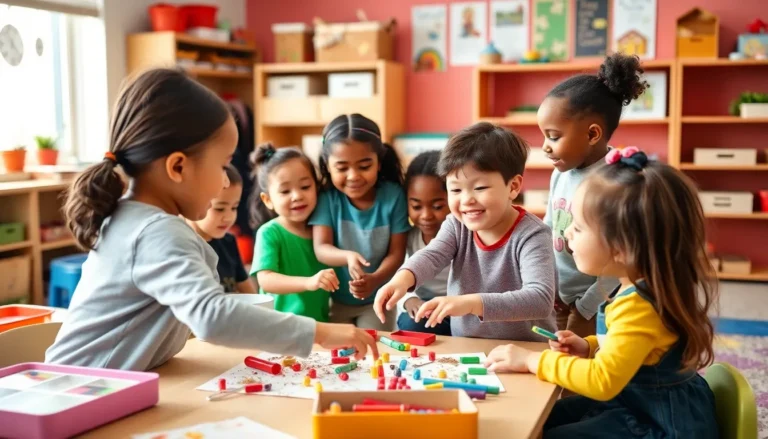Table of Contents
ToggleIn a world where toddlers seem to have endless energy and curiosity, finding the right activities can feel like searching for a needle in a haystack. Enter Montessori toddler activities—where learning meets play in the most delightful ways. These activities are designed to nurture a child’s natural instincts while keeping them engaged and entertained. Who knew that a simple spoon could be the key to developing fine motor skills?
Imagine a toddler joyfully pouring water from one container to another, all while you sip your coffee in peace. Montessori methods encourage independence and exploration, allowing little ones to thrive in a hands-on environment. So if you’re ready to turn your living room into a mini Montessori classroom, buckle up! It’s time for some fun, laughter, and a sprinkle of genius that’ll keep those tiny hands busy and those little minds buzzing.
Overview Of Montessori Toddler Activities
Montessori toddler activities focus on fostering independence and creativity in young children. Engaging toddlers in hands-on tasks allows them to explore their interests while developing essential skills. Pouring water or transferring objects builds fine motor skills, enhances concentration, and promotes coordination.
Activities typically involve everyday materials, making them accessible for parents to implement at home. Material selection often includes wooden toys, art supplies, and household items, which children can manipulate. Encouraging self-directed learning nurtures curiosity and instills a sense of responsibility.
Sensory experiences form an integral part of Montessori activities. Activities such as sensory bins filled with rice or beans invite exploration and discovery. Art projects using natural materials, like leaves and flowers, stimulate creativity while connecting children to their surroundings.
Developing practical life skills remains a cornerstone of Montessori philosophy. Simple tasks, like sweeping or folding cloths, help children feel valued and useful. These activities contribute to a child’s sense of accomplishment and self-esteem.
Group work encourages social interaction. Activities that involve collaboration, such as cooking or gardening, foster communication and teamwork. Children learn to share and take turns, vital skills for their social development.
Creating a prepared environment plays a crucial role in successful Montessori activities. Setting up engaging spaces with meaningful materials encourages children to engage independently. A well-organized area allows toddlers to explore freely, supporting their natural learning process.
Benefits Of Montessori Toddler Activities
Montessori toddler activities offer numerous benefits that positively influence child development. These activities promote learning through play, essential for nurturing young minds.
Cognitive Development
Cognitive development thrives in an engaging environment filled with sensory activities. Toddlers practice problem-solving by navigating open-ended tasks. When using everyday materials, they enhance their reasoning skills. Exposure to various activities stimulates curiosity, motivating them to explore concepts like volume and spatial awareness. Fine motor skills strengthen through practical tasks like pouring or sorting. Such hands-on experiences enhance concentration and focus. Overall, Montessori activities foster observational skills that contribute to effective learning.
Social Skills
Social skills flourish when toddlers participate in group activities. Sharing toys promotes patience and cooperation. Through collaborative play, they learn to negotiate and resolve conflicts, gaining valuable interpersonal skills. Learning to take turns fosters a sense of fairness and respect for others. Engaging with peers in group settings encourages social awareness and emotional intelligence. Interaction during these activities builds friendships and strengthens communication skills. Children develop empathy as they understand different perspectives through shared experiences.
Independence
Independence blossoms through the child-led nature of Montessori activities. Toddlers gain confidence by making choices in a prepared environment. When engaging in practical life skills, such as cleaning or dressing themselves, they develop self-sufficiency. Freedom to explore interests promotes a sense of ownership over learning. Encouragement to complete tasks fosters perseverance. By practicing self-discipline, children learn responsibility and accountability for their actions. Overall, these activities empower toddlers to trust themselves and their abilities.
Types Of Montessori Toddler Activities
Montessori toddler activities come in various types, each focusing on different developmental areas. Engaging children in these activities promotes holistic growth through hands-on experiences.
Practical Life Activities
Practical life activities allow toddlers to engage in everyday tasks. Activities like pouring, sweeping, and folding clothes enhance fine motor skills and foster independence. Children learn to manage their environment while developing coordination. These tasks build self-esteem and a sense of accomplishment, as children contribute to family life. Simple tools like small brooms or child-sized utensils make these activities accessible and enjoyable.
Sensorial Activities
Sensorial activities help toddlers refine their senses through exploration. Materials like textured fabrics, colored beads, or scented jars facilitate sensory development. Varying textures and colors enable children to distinguish different attributes, enhancing cognitive skills. Engaging with sensory bins encourages imaginative play while stimulating curiosity. An emphasis on natural materials ensures rich, immersive experiences, fostering a deeper connection to the environment.
Language Activities
Language activities support vocabulary development and communication skills. Storytelling and interactive reading sessions enhance language exposure. Use of picture cards and matching games encourages word recognition and understanding. Singing songs and rhymes promotes phonetic awareness and rhythm. These activities create a rich language environment, allowing children to express thoughts and ideas confidently.
Math Activities
Math activities introduce foundational concepts through tangible experiences. Counting objects like blocks enhances numerical understanding. Simple sorting and classifying tasks help toddlers recognize patterns and relationships. Using measuring cups during water play strengthens mathematical reasoning and spatial awareness. These hands-on experiences cultivate an early love for numbers, making math enjoyable and engaging.
Tips For Implementing Montessori Activities At Home
Creating a Montessori-inspired environment at home fosters independence and exploration. Start by organizing a designated play area with accessible shelves for materials. Rotate toys regularly to maintain engagement and interest.
Incorporate everyday items into activities, such as measuring cups or small towels, to enhance practicality. Respect the child’s choices and interests, allowing them to direct their own learning experiences.
Establish routines that encourage responsibility, such as cleaning up after play or helping with household tasks. Use open-ended questions during playtime to promote critical thinking and problem-solving skills.
Allow for uninterrupted play to let toddlers explore ideas deeply. Encourage safe risk-taking by providing opportunities for challenges, such as climbing on soft furniture or balancing on a low beam.
Be patient during the learning process; mastery takes time and repetition. Demonstrate activities when introducing new tasks, offering guidance without completing the task for them.
Connect activities to real-world experiences; gardening or cooking as a family nurtures a sense of accomplishment. Monitor development closely, adapting activities to fit the child’s evolving interests and skills.
Implement sensory activities regularly to refine toddlers’ senses, providing materials with diverse textures and colors. Celebrate achievements, no matter how small, to build confidence and self-esteem.
Montessori toddler activities offer a unique blend of learning and play that nurtures independence and creativity. By engaging children in hands-on experiences with everyday materials, parents can foster essential skills while allowing their toddlers to explore their interests. The emphasis on practical life skills and sensory experiences not only enhances cognitive development but also builds social skills and emotional intelligence.
Creating a Montessori-inspired environment at home encourages self-directed learning and empowers toddlers to take charge of their exploration. By celebrating small achievements and providing opportunities for safe risk-taking, parents can help cultivate a sense of accomplishment and confidence in their children. Embracing these activities ensures that toddlers thrive in a supportive and enriching atmosphere.








